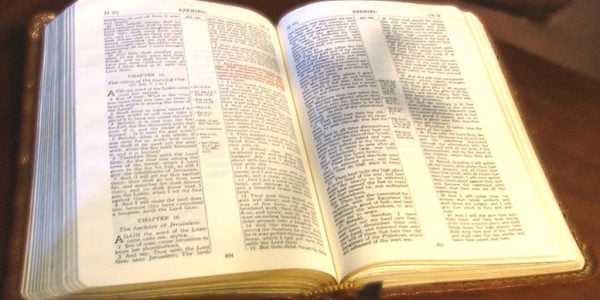
The book of Acts is supposed to model for us how the early church engaged in discernment and made its decisions. Surprisingly, the one thing we do not see the apostles do is consult scripture as a reference manual the way that we think we’re supposed to do today. The three most decisive acts of discernment occurred through the prophecy of Gamaliel and the visions of Paul and Peter. Thus it seems entirely appropriate for the United Methodist General Conference to consider these three resources as we enter into a time of discernment.
1. Gamaliel’s prophecy
But a Pharisee in the council named Gamaliel, a teacher of the law, respected by all the people, stood up and ordered the men to be put outside for a short time. 35 Then he said to them, “Fellow Israelites,[e]consider carefully what you propose to do to these men. 36 For some time ago Theudas rose up, claiming to be somebody, and a number of men, about four hundred, joined him; but he was killed, and all who followed him were dispersed and disappeared. 37 After him Judas the Galilean rose up at the time of the census and got people to follow him; he also perished, and all who followed him were scattered. 38 So in the present case, I tell you, keep away from these men and let them alone; because if this plan or this undertaking is of human origin, it will fail;39 but if it is of God, you will not be able to overthrow them—in that case you may even be found fighting against God!” Acts 5:34-39
If it’s of human origin, it will fail, but if it’s of God, you will not be able to stop it. I’ve built my entire theology and ministry off of the assumption that queer Christianity is of God. If it’s completely a human invention, then I would have to jettison every theological insight I’ve had since I first walked through the doors of Central Avenue United Methodist Church in the winter of 2001. Because that mostly LGBT church gave me the gospel as I understand it and rescued me from what I now consider to be a toxic caricature of the gospel. And I’ve carried the gospel I received with me every time I’ve opened the Bible. It’s shaped how I’ve read every verse that I’ve read since then and each of those interpretations has shaped subsequent interpretations. So if someone were able to convince me that none of that was from God, I guess I would have to become an atheist.
All this is just to say that we aren’t merely having a debate about a few Bible verses. We’re defending our entire life stories. I imagine that on the opposite side of the issue, there’s a lot more going on than just your interpretation of scripture. There are loving mentors who taught you how to read the Bible and how to understand morality. They were humble, beautiful people, and now they’re dead. And so when some amateur sociologist blogger comes around and speaks glibly about the heteronormative bigotry that’s “really” behind your Biblical interpretation, it’s like pissing on the graves of the people who shaped you. Or maybe that’s not it at all. Maybe you really need for this to be strictly, entirely impersonal and objective. If so, that’s fine.
We look for rotten spiritual fruit that proves the other side is not of God. Like that broken chalice in 2004. Oh so much mileage has been reaped out of that one! It proves once and for all that the LGBT inclusion side is completely irreverent, disrespectful, and thus of the devil. But not so fast. Because there’s Westboro Baptist Church. And all the hard-core homophobic culture warriors over the past several decades who one after another turned out to be adulterers or closet gays themselves. And so back and forth we go with all the reasons that the other side doesn’t deserve to be heard. Like the US Senate, we’re not even going to hold a hearing, because we already know that NO is the answer regardless of what the question is.
What if instead of searching for means of discrediting our opponents, we looked for what they have that is of God? What if we scrutinized ourselves to purge any motives or behaviors that are not of God? What if we actually took responsibility for the Christlikeness of our witness instead of thinking that the ends justify the means when we play dirty and demonize other people? I don’t think either side is devoid of God or full of God. The “of God” part will happen in the holy, humanizing conversations we didn’t think possible in such a bitterly divided denomination. The “of God” part will happen when people are convicted of their own sin and seek reconciliation with others they have mistreated. The “of God” part will happen when we take our fingers out of our ears in order to listen to other people listening to God.
2. Paul’s vision
Meanwhile Saul, still breathing threats and murder against the disciples of the Lord, went to the high priest 2 and asked him for letters to the synagogues at Damascus, so that if he found any who belonged to the Way, men or women, he might bring them bound to Jerusalem.3 Now as he was going along and approaching Damascus, suddenly a light from heaven flashed around him. 4 He fell to the ground and heard a voice saying to him, “Saul, Saul, why do you persecute me?” 5 He asked, “Who are you, Lord?” The reply came, “I am Jesus, whom you are persecuting. 6 But get up and enter the city, and you will be told what you are to do.” Acts 9:1-6
I’ve become convinced that Jesus’ question to Saul is his question to us: Why do you persecute me? I see this question as a hugely important part of our salvation a.k.a. how Jesus saves the world from us. How are we persecuting Jesus through how we treat our enemies? It’s too easy for me to say that my enemies are just like Saul of Tarsus and every other Pharisee. They love rules more than anything else. They’re zealous for God’s glory at the expense of their compassion for humanity. They would have crucified Jesus for being a heretic and rule-breaker if they were alive back then.
But can I see Christ in my enemies? If I cannot see any semblance of Jesus in them, then I am probably persecuting Jesus through how I’m treating them. Jesus doesn’t let you call your enemy a heretic or an oppressor to excuse yourself from showing them kindness. This doesn’t mean that I neglect from speaking the truth I believe I’ve been given to share. It does mean that whatever I say should happen with much prayer, fear, and trembling.
Even if you think the other side’s complaints of “persecution” are unreasonable and ridiculous, try to imagine what they feel like. Try to imagine what it would be like to grow up gay in a church where sermons were preached bashing gay people so you force yourself to be straight, marry someone of the opposite sex, and discover that everything fails in the bedroom which completely wrecks you and your spouse emotionally until you finally tell your awful secret and divorce so that your spouse can find a partner with whom there will be actual biological chemistry. Try to imagine what it would be like to wrestle deeply with scripture and tradition because you have gay people in your life whom you love but you feel like it will destroy your faith to contradict what you believe the Bible teaches.
Speak your truth, but don’t persecute Jesus.
3. Peter’s vision
About noon the next day, as they were on their journey and approaching the city, Peter went up on the roof to pray. 10 He became hungry and wanted something to eat; and while it was being prepared, he fell into a trance. 11 He saw the heaven opened and something like a large sheet coming down, being lowered to the ground by its four corners. 12 In it were all kinds of four-footed creatures and reptiles and birds of the air. 13 Then he heard a voice saying, “Get up, Peter; kill and eat.” 14 But Peter said, “By no means, Lord; for I have never eaten anything that is profane or unclean.” 15 The voice said to him again, a second time, “What God has made clean, you must not call profane.”16 This happened three times, and the thing was suddenly taken up to heaven. Acts 10:9-16
Peter’s vision is the foundation for the most decisive event that happens in the book of Acts: the opening of the church to the Gentiles which ultimately leads to the abandonment of the Jewish law by Christians who had not previously considered themselves to be starting a new religion. They were following the one whom they considered to be the Jewish messiah; therefore it made sense to continue to dissociate from Gentiles who were uncircumcised and therefore unclean. There was a protocol for Gentile conversion to Judaism, though many Gentiles chose to become “God-fearers” who worshiped with Jews but did not fully put themselves under Jewish law.
Notice the formula of God’s statement to Peter. He isn’t saying that Gentiles have been clean all along and there was just a misunderstanding of Jewish law. He says that he has made Gentiles clean. This represents a change in God’s law. But this vision isn’t enough by itself. On the basis of this vision, Peter goes to Cornelius’ house, shares the gospel, and witnesses something dramatic. Before he has the chance to baptize Cornelius’ family, the Holy Spirit breaks out in their midst and causes them to speak in tongues and praise God (Acts 10:46).
After this happens, a debate breaks out among the apostles about the status of Gentiles and whether they need to be circumcised to join Jesus’ movement. The Pharisees among Jesus’ movement say, “It is necessary for them to be circumcised and ordered to keep the law of Moses” (Acts 15:5). But Peter’s testimony about the Spirit’s presence among Cornelius’ household is the decisive factor that sways the conversation. Barnabas and Paul share their own testimony about signs and wonders that have happened among the Gentiles.
Then the apostle James, who appears to be the authority figure, turns to a prophecy from the Hebrew scripture that seems to confirm what has been happening:
My brothers, listen to me. 14 Simeon has related how God first looked favorably on the Gentiles, to take from among them a people for his name. 15 This agrees with the words of the prophets, as it is written,
16 ‘After this I will return,
and I will rebuild the dwelling of David, which has fallen;
from its ruins I will rebuild it,
and I will set it up,
17 so that all other peoples may seek the Lord—
even all the Gentiles over whom my name has been called.
Thus says the Lord, who has been making these things 18 known from long ago.
Notice that nothing about this prophecy says anything about circumcision. It doesn’t clarify what are the covenantal requirements of the “other peoples” who “seek the Lord.” Anybody could have argued back, “Yes, the Gentiles can seek the Lord by being circumcised and following Moses’ law. Nobody is stopping them from doing that.” But in that moment, the Holy Spirit drew James to this passage and it was illuminated for him and the other apostles in a way that simply cannot be transmitted to us through the written text.
It’s very important to notice how scripture does and does not function in this story. Scripture is not a manual that the apostles flip through in order to find explicit direct mandates to follow. Scripture has two roles in this story. The first one is more subtle. Peter doesn’t just randomly receive a vision from God. He receives it in the context of prayer, which for Peter did not mean the “Jeezuswejus” that we call prayer today, but specific prayers he received from the Jewish scriptures. If we want to receive discernment from God, we need to pray like Peter and we need to pray using the Bible. This may go against the rationalistic, “objective” way that low-church Protestantism has taught us to use scripture, but it’s the way the Roman Catholics have used scripture for centuries. Scripture is studied not to gain objective head-knowledge, but to shape the heart for our life’s liturgy.
The second use of scripture is what James does. He looks for a prophecy to figure out what the Holy Spirit is doing. He didn’t feel any need to adjudicate whether or not the Abrahamic covenant of circumcision could be invalidated on the basis of other scripture. The Holy Spirit moved differently than anticipated, but he didn’t trust a purely experiential interpretation of this movement so he looked for a confirmation in the Bible’s prophecy. We read the Bible to understand how the Spirit speaks. But if our discernment is flipping through the Bible like a legalistic reference manual, then we are living as though the Spirit doesn’t exist. The goal is not to have an objective, impersonal grasp of the Bible as a static, ancient document. The goal is for our scripture to become entirely subjective and infused into our personal experience so that we can listen directly to the living God.
So whatever conclusions we make about LGBT inclusion or any other issue, if we follow the examples of Peter and James, the Bible provides us with the prayer and prophecy we need to listen to the Spirit, but the listening itself is where the discernment happens. If you read a few verses from the Bible, decide how you will believe on a particular issue forever, and close your ears, then you’re not doing what Peter and James did.











